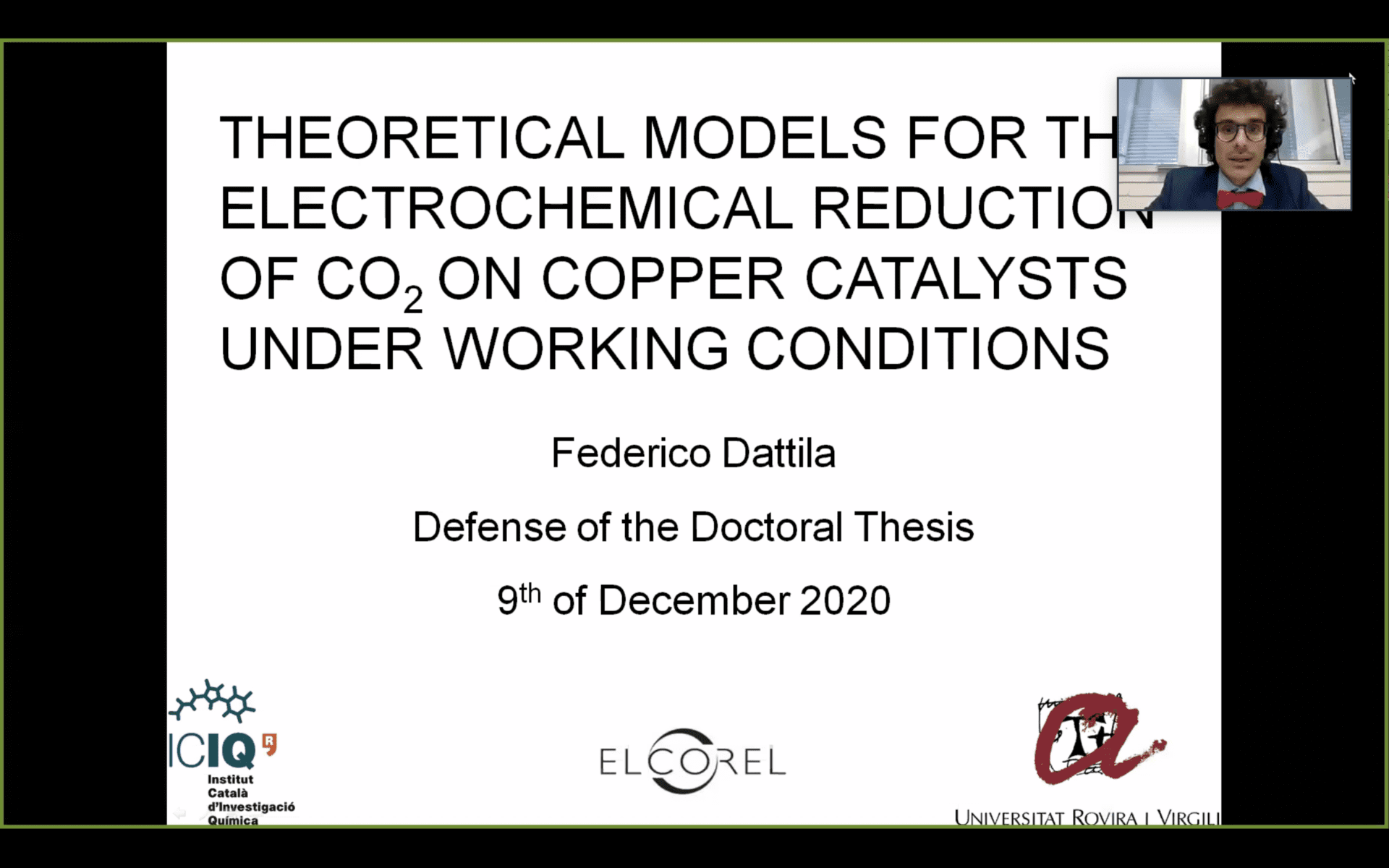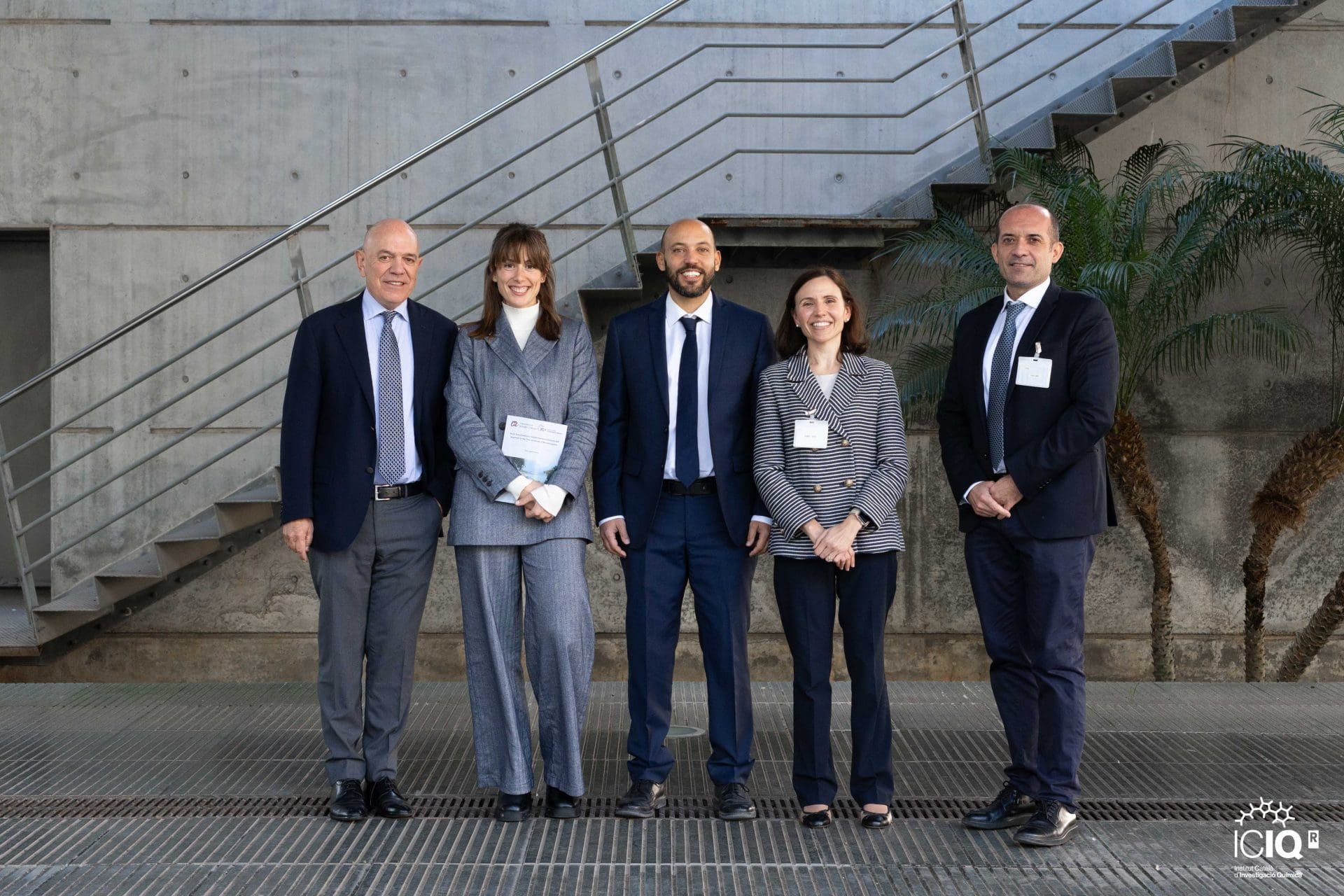Congratulations, Dr. Dattila!
Federico Dattila, PhD student under the supervision of Prof. Núria López and Dr. Rodrigo García Muelas (ICIQ), has virtually defended his PhD thesis entitled “Theoretical Models for the Electrochemical Reduction of CO2 on Copper Catalysts under Working Conditions” (assigned to the Department of Physical and Inorganic Chemistry of the Universitat Rovira i Virgili) publicly on December 9th.
The members of the evaluation committee were: Prof. Beatriz Roldán Cuenya (Fritz Haber Institute of the Max Planck Society), Prof. Emilio Palomares (ICIQ), and Prof. Marc Koper (Leiden University).
Dr. Dattila is from Vigone, a small town close to Turin, Italy. After graduating from high school with a diploma in humanistic studies, he obtained his bachelor and master’s degrees in Physics from the University of Turin. Through an Erasmus at Chalmers University of Technology, he learned chemistry so he could begin his PhD at ICIQ. His PhD, within the ELCoREL project, was funded by a Marie Skłodowska-Curie Actions grant. He is a curious and inquiring person; he likes to learn about different topics. Also, he says he has an infinite list of hobbies, but his most relevant are: playing (beach)volleyball, reading, cooking, volunteering, doing outreach and talking about politics.
Why did you become a scientist? What would you want to achieve as a scientist?
As a child I wished to become a lawyer to get into politics, that’s why I studied ancient Greek and Latin at high school. Then, I realised that a good politician needs to understand humanity very well, thus I turned to the most fundamental science I knew, Physics. But at the University of Turin, I learnt about the existential threat of climate change. So, here I am now, a researcher focused on CO2 reduction.
I don’t want to achieve anything particular as a scientist, apart from leaving behind me a better society and world. Furthermore, I believe I need solid, scientific thinking in each of my future steps: as a researcher, worker, citizen, politician, etc.
From the lessons learnt at ICIQ, which one do you value the most?
The best lesson I got is “do your best not to work on the weekend.” You need these two days to disconnect and to come back on Monday with new energies and ideas. It’s vital to let your brain rest a bit, otherwise, you will soon realise that the quality of your science will drop. Your brain is an invaluable part of you and it is unfortunately impossible to replace it with a new one as an outdated computer. Remember to value yourself!
What ICIQ moment you´ll never forget? What will you miss the most from ICIQ?
There have been plenty of funny moments at ICIQ for me, but here I will recall only two. The first one is when we recreated Maurizio Cattelan’s ‘Comedian’ (i.e. a banana on the wall) on one of the columns of the theoretical lab together with Edvin Fako. The second is a recurrent one: to hear clapping and then realise it’s just Bob killing another mosquito.
What I will miss the most from ICIQ is the people. I may find other good lab equipment and other good scientific books somewhere else. However, it will be hard to find the genuine and nice people I met in these three years. Luckily, I am sure we will keep in touch.
What advice do you have for someone who’s starting their PhD now?
First, I’d say don’t worry if results do not come, since science needs time and eventually you get all the results you need. Other important bits of advice: (1) Have a life outside work; (2) keep your relationships strong and solid, and (3) look for the right research question before running 1000 experiments or simulations. Advice (1) will speed up your research thanks to the network and support you will build up, tips (2)-(3) will avoid burnout when nothing is working!
Where are you going next? What will you do there?
I am going to the best possible place for now: ICIQ! I cannot leave the institute now that so many changes are happening, and a bright future is yet to come! I will stay in the group of Prof. Núria López for one more year as a Post-Doc to try to give back everything I got in these three years. From 2022, I’ll move back to Turin, either as a researcher at the Polytechnic of Turin or as a high school teacher in Math and Physics. We will see.
If you were a piece of lab equipment, what would you be?
Probably a chair or a table. We usually take them for granted but without them, we could never work as comfortably as we do. Every time you are tired or mentally destroyed, you can always sit on the chair and relax a bit.
Related news

Let's create a brighter future
Join our team to work with renowned researchers, tackle groundbreaking
projects and contribute to meaningful scientific advancements








 10-01-2025
10-01-2025 


















